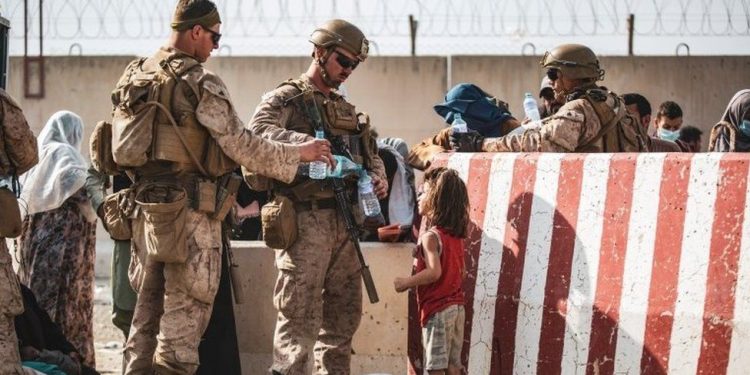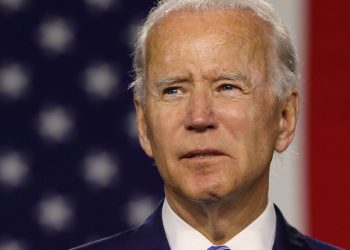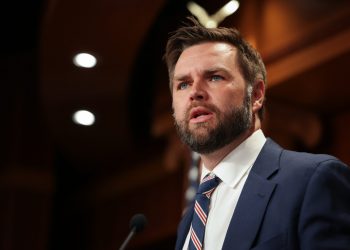The US aims to complete evacuations from Taliban-controlled Afghanistan by a 31 August withdrawal deadline – as calls grow from allies to extend it.
The Pentagon said it was not yet at the point to seek a change, though the UK, France and Germany will step up pressure at a virtual G7 summit.
The Taliban told the BBC that any extension would violate an agreed deal.
Tens of thousands have been evacuated, but others seeking to flee remain crammed in or near Kabul airport.
US President Joe Biden is expected to decide within the next 24 hours on whether to extend the timeline for withdrawal, Reuters news agency reports.
An unnamed official told the agency the decision would be made in order to give the Pentagon time to prepare.
At Kabul airport on Monday, dozens crowded around the BBC’s Secunder Kermani, desperately flashing documents to try to get on to flights they had not been given permission to board.
The crush makes it difficult for those who have received emails telling them to turn up at the airport to gain access, he says.
One Canadian official told Reuters the crowds were “intense, violence is becoming more common”.
US Maj-Gen Hank Taylor said at a Pentagon briefing that 16,000 people had been evacuated from Kabul airport in the 24 hours to 07:00 GMT on Monday.
This brings the total evacuated on US flights since an intense airlift started on 14 August to 37,000, Gen Taylor said.
The airlift began as the Taliban moved into Kabul following a lightning campaign that has seen them take over almost all of the country in the wake of the US decision to withdraw forces.
The sole remaining area holding out appears to be the Panjshir region north-east of Kabul, a stronghold of anti-Taliban opponents who says thousands of people are ready to carry on the fight.
White House national security adviser Jake Sullivan said the US was in daily talks with the Taliban through political and security channels, although Mr Biden was not considering direct talks at this time.
He said the US believed all Americans who wanted to leave Afghanistan could be evacuated by the deadline, but that Mr Biden would also take a “day-by-day” approach on whether to extend it.
Earlier, Pentagon spokesman John Kirby said: “Our focus is on getting this done by the end of the month.”
If commanders on the ground said an extension was needed it would be passed to President Biden, he said, but added: “We just aren’t there right now.”
He added: “We’ve seen the public statements by the Taliban spokesman about their views on the 31st of August. I think we all understand that view.”
Mr Kirby was reluctant to give the specific number of Americans evacuated so far, saying it was in the “thousands”.
He also said there were no plans at present to add to the 5,800 troops securing the airport and overseeing evacuations.
Mr Kirby said that, on at least one occasion, the US had used a helicopter to bring people to the airport.
Former state department official James Steinberg told the BBC there was a good chance Joe Biden would extend the evacuation deadline in order to protect the remaining Americans – and the president would probably not give the Taliban “an option to veto” it.
The UK, France and Germany have all indicated evacuations will have to continue beyond the deadline.
Mr Biden and UK PM Boris Johnson spoke by telephone about the G7 summit taking place on Tuesday. The main point of debate will be whether foreign troops will remain to oversee evacuations or whether they can continue via a civilian operation.
Germany’s Foreign Minister Heiko Maas has said that talks are taking place with allies – and with the Taliban – on civilian operations.
The UK has said that any foreign military presence at Kabul airport would not be able to continue without the US troops.
Mr Kirby said it was “conceivable, even without a US military footprint, that people will be able to get out of Kabul”.
Taliban spokesman Suhail Shaheen had earlier told the BBC that people would still be able to leave on commercial flights after the deadline.
He said: “We are not putting hurdles in their way if they have a passport issued – they can go on commercial flights at any time. We want them to stay in the country but if they intend to go, they can.”
However, many Afghans, particularly those who worked with foreign forces, live in fear of reprisals from a group that imposed a harsh version of Islamic law when in power from 1996 to 2001.
The Taliban were ousted by US and allied troops following al-Qaeda’s 11 September 2001 attacks. A 20-year conflict ensued.
Mr Shaheen tried to paint a conciliatory picture for those Afghans who stay, asking them to help rebuild the country.
But he stressed there would be “consequences” if the foreign forces stayed beyond 31 August. He did not elaborate on what this would mean, saying only that the Taliban leadership would decide.
source: BBC



















































